By Noah Greenfield ’24
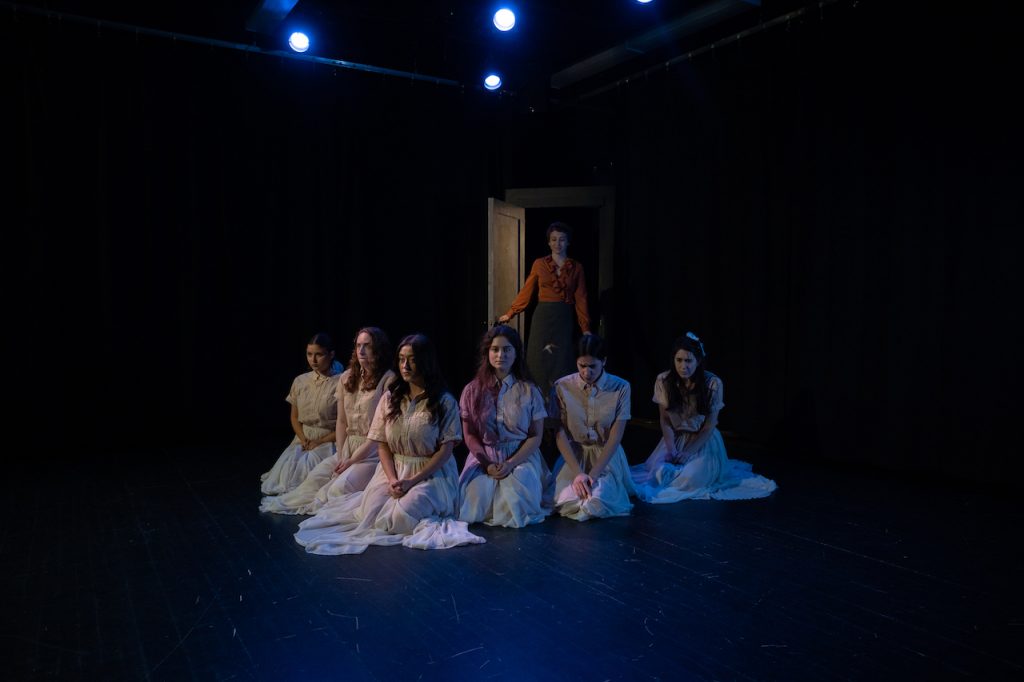
Skidmore’s production of The Cagebirds, a play written by David Campton and directed by Tait Brencher (‘23) was a haunting depiction of the fear and love that can keep people trapped without even giving a second thought to whether they can leave.
The play begins with the cagebirds scattered around the set, some sitting, some standing, some curled in on themselves. They all wear flowing white skirts and simple pale button downs with ribbons in their hair. The costume designer Lily Lugiano (‘26) met with each actor individually to add small details to their skirts, like food stains or dirt smudges or tears to help set each bird apart while maintaining their uniformed look. The set, designed by director Tait, had two black curtains framing a corner of the birds’ room with a grey door in the center. The other two walls were made up of audience seating, contributing to the feeling that we were trapping the birds for our own viewing pleasure. The lights, designed by Isaac DeMarchi (‘23), are soft and simple; a cool light pushes against the back of the birds and the warm light illuminates them from the front. There is a constant mechanical hum in the room that builds the feeling of being deep indoors, far from nature, implemented by sound designer Erin Arnold (‘23). The play begins and the birds curtsy, their skirts forming wings. Then they flit about their room speaking in unison before slowly separating into their distinct characters.
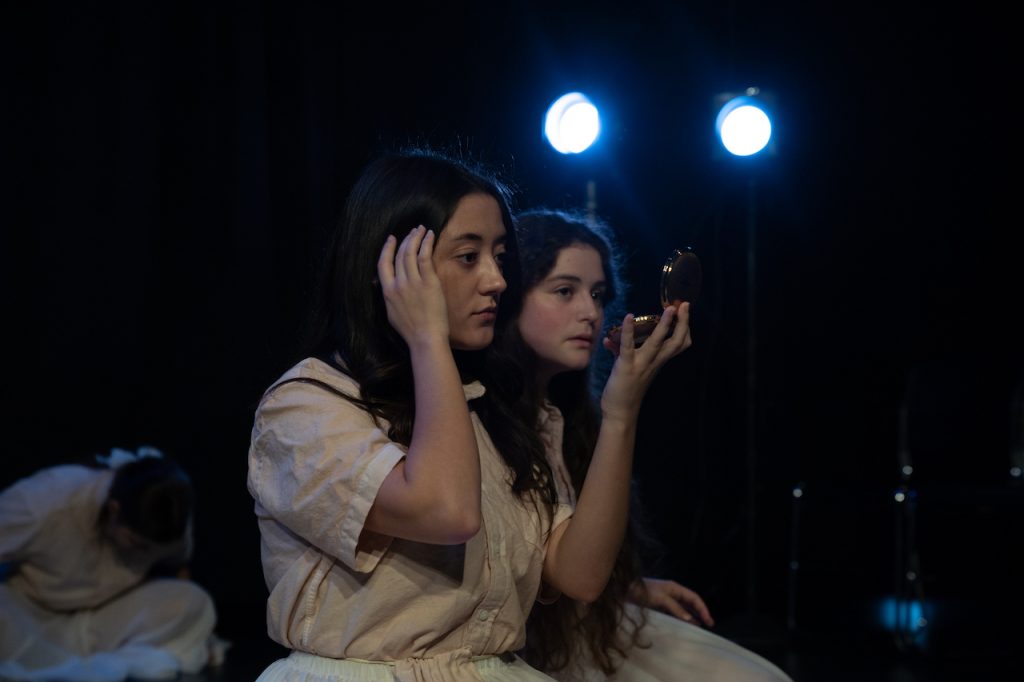
Gloom (Logan Waugh ‘26) has chronic pain, talking about their trick knee and their fear of further complications. Gazer (Juli Moreira ‘23) emerges as vain, focused only on her hair, makeup, and skincare as the others move on around her. Gossip (Isadora Zucker ‘25) spreads nasty rumors about characters we never meet. Guzzle (Georgie Svrcek ‘25) has food on the mind and like Gazer won’t hear or talk about anything not to do with it. Twiting (Katie Locke ‘26) is anxious, speaking soft and fast, terrified of making a decision or taking a stance. Thump (Erin Einzig ‘23) is extremely authoritarian and orderly, distressed by anything that strays from her status quo. They each get their moment to flutter around the room, telling the others about their respective issue or hobby, then settling down to twitch and preen.
Then, the Mistress (Maddie Evans ‘24) enters, calling the birds her “sweeties” and asking “please don’t be unhappy.” She goes on to check in with them about their respective issues, showing that she cares about the birds as individuals while keeping them safe and well in their room. The cagebirds love and appreciate her. The next time the Mistress enters, it’s to drag in the Wild One (Leah Alden Cunningham ‘23). Unlike the other birds, she craves the outside world and sees injustice in the Mistress’s treatment. She comes in guns-a-blazin, screaming at the cagebirds’ beloved Mistress, pounding at the door, telling the birds they are trapped and unhappy with their little lives. The cagebirds ignore her, speaking only of their respective fixations. “Isn’t there room for anything else in your mind?” the Wild One asks. “You have to ignore me because if you didn’t you’d have to break out or break down” she tells them.
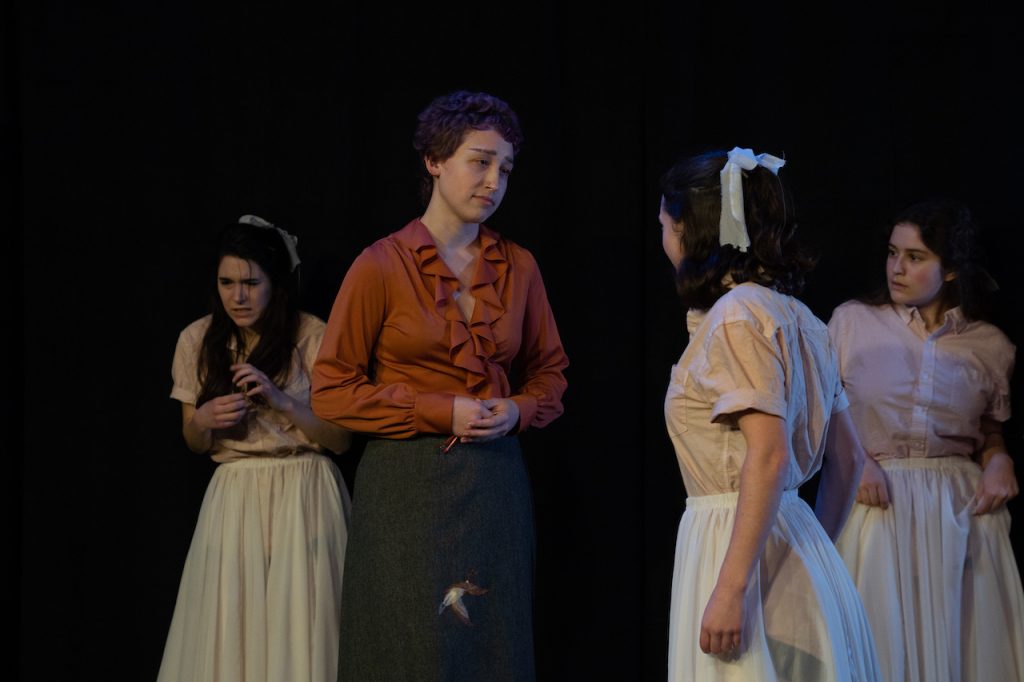
The cagebird the Wild One first latches onto is Twiting, who is desperately afraid to make a decision or take a stand, including being aggressive in her dismissal of the Wild One. The Wild One first tries to rally some anger against the Mistress, then when that fails she describes the allure of the outside world, trying to build hope. Leah’s delivery of the monologue is gorgeous, helping the audience appreciate the beauty of the outside, but Twiting and the others are unconvinced. As far as they know, the Wild One has no interests except getting back to that world. In their room they may be obsessed with the mistress, but at least they each have something special to them. The Wild One has dismissed their fixations at every turn, saying they stand in the way of paradise, but that can’t ring true when those fixations are the very things that have allowed them some version of a life in their cage. When we finally develop defense mechanisms that help us feel like ourselves in an abusive situation, a better situation can feel horrifying because we wouldn’t have our safety blankets anymore. The fact that we wouldn’t need them doesn’t register, just the fact that they’d be gone.
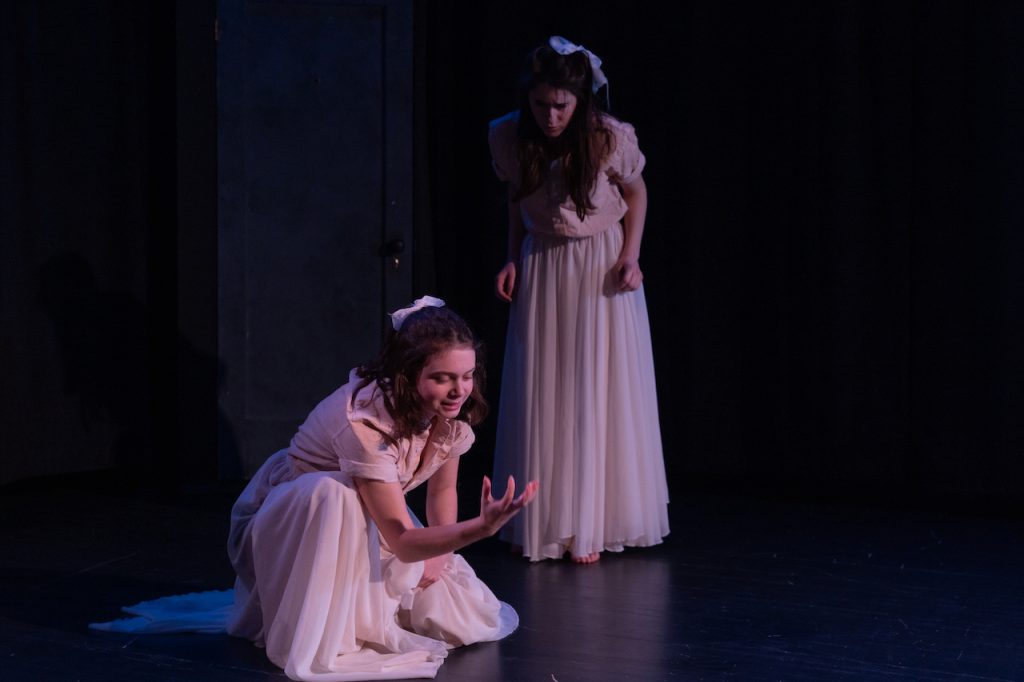
However, when the Wild One demands a hairpin to unlock the door, it is Twiting that provides it. Not out of allegiance to the Wild One or her mission, but because she’s scared to believe anyone is in the wrong. Beyond the now open door we see a golden glow, so unlike the stark lighting of the room. The humming of the room goes quiet, replaced by the peaceful quiet of the wide world. The Wild One tries then to appeal to the cagebirds through their interests, luring Guzzle with promises of fresh food growing on the ground and trees. Guzzle steps bravely through the door to stand in the golden light, taking it all in before breaking with overwhelm, chanting “too much too many too big too far,” and retreating back to the safety of the room. Gossip chastises the Wild One, explaining that the mistress takes care of them, and takes proud ownership of their self-described prison. The cagebirds gang up and beat the Wild One to death for exposing them to such danger, all the while the door to freedom stands open behind them. A golden light washes the Wild One as she’s beaten and dies with her.
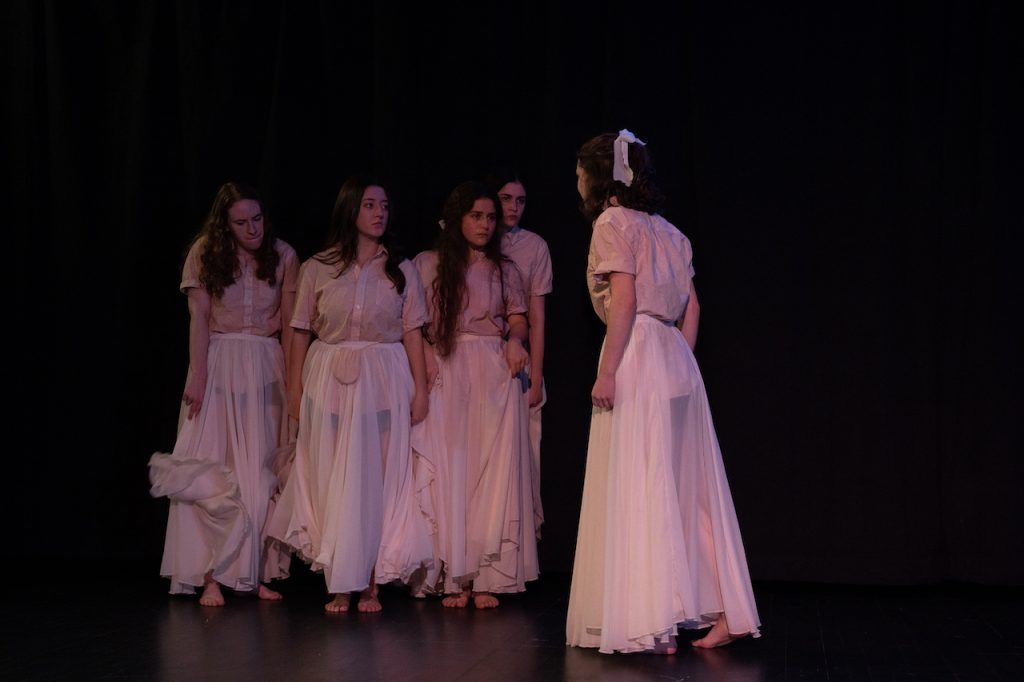
The Mistress finds them and chastises them for killing the Wild One, saying she’ll miss her and that the others “couldn’t understand her song.” She never saw the Wild One as a threat to the world she created, she was sure her sweeties would reject the outside world. She even leaves the door open when she departs. When she is gone, Twiting who has been processing off to the side comes forward to restate the Wild One’s message, finally believing it herself. The others turn to her, listening intently. I believed she could convince them because she was one of them. The Wild One’s legacy would live on, she only needed to touch one heart and the rest would learn to see what she did. But the other’s swarmed on Twiting and beat her too in a heartbreaking finale. The whole time she begs for her life, spilling over herself trying to apologize for having an opinion.
